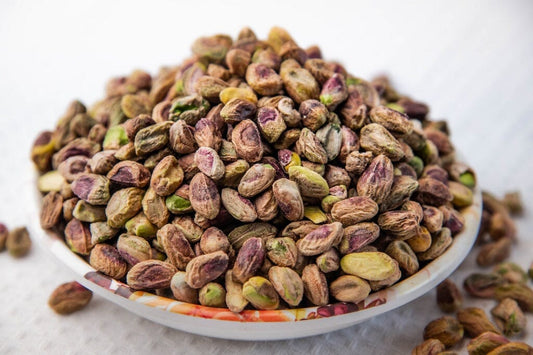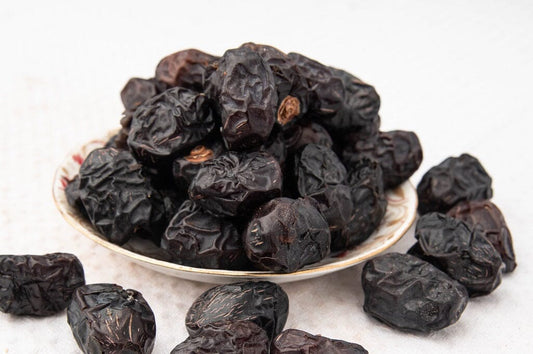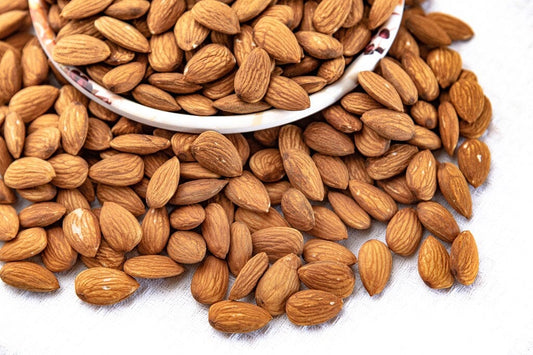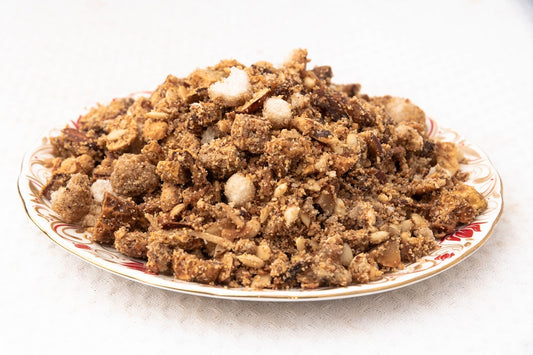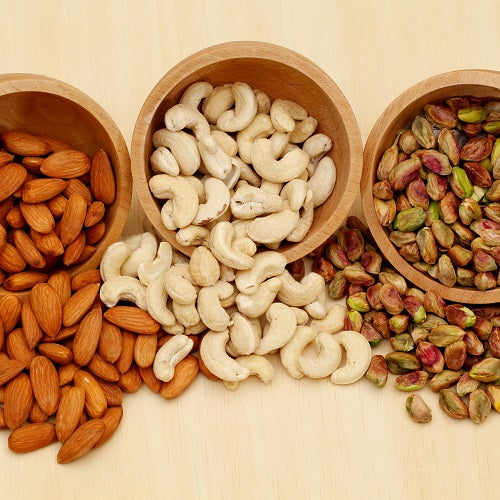The almond is a species of tree native to Iran and surrounding countries but widely cultivated elsewhere. The almond is also the name of the edible and widely cultivated seed of this tree. Within the genus Prunus, it is classified with the peach in the subgenus Amygdalus, distinguished from the other subgenera by corrugations on the shell (endocarp) surrounding the seed.
The fruit of the almond is a drupe, consisting of an outer hull and a hard shell with the seed, which is not a true nut, inside. Shelling almonds refers to removing the shell to reveal the seed. Almonds are sold shelled or unshelled. Blanched almonds are shelled almonds that have been treated with hot water to soften the seed coat, which is then removed to reveal the white embryo.

Almond is a powerful tool that can be used to maintain and improve your health. Almonds are one of the healthiest foods on the planet, rich in nutrients that can help your body maintain wellness and fight off disease. The health benefits of almonds include an ability to lower cholesterol; this food may also lower blood pressure and bring reduced risk of cancer and heart disease.
All the almonds that you see for sale in your local grocery store are of the sweet variety.
Sweet almonds come in many different types. Often, different regions specialize in growing specific varieties. For example, Marcona and Valencia almonds are typically grown in Spain. Almond growers in California produce more than 25 different varieties of this tree nut. These nuts are contained in a shell or skin. A key difference that separates the various types concerns the hardness of the shell. Some varieties have softer shells, while others have shells that are relatively hard.
According to the United States Department of Agriculture (USDA), there are 579 calories in 100 grams of almonds. That portion is equal to a half-cup serving size, and it contains the following nutrients:
- Protein – 21.15 g
- Carbohydrates – 21.55 g
- Net carbs (total carbs minus fiber) – 9 g
- Calcium – 269 mg
- Iron – 3.71 mg
- Magnesium – 270 mg
- Phosphorus – 481 mg
- Potassium – 733 mg
- Sodium – 1 mg
- Zinc – 3.12 mg
- Copper – 1.031 mg
- Manganese – 2.179 mg
- Selenium – 4.1 µg
- Thiamin – 0.205 mg
- Riboflavin – 1.138 mg
- Niacin – 3.618 mg
- Pantothenic acid – 0.471 mg
- Vitamin B6 – 0.137 mg
- Folate – 44 µg
- Choline – 52.1 mg
- Betaine – 0.5 mg
- Beta carotene – 1 µg
- Vitamin A – 2 IU
- Lutein + zeaxanthin – 1 µg
- Vitamin E – 25.63 mg
- Saturated fatty acids – 3.802 g
- Monounsaturated fatty acids – 31.551 g
- Polyunsaturated fatty acids – 12.329 g
As you can see from the information above, the almond nut is low in saturated fat. And it’s high in healthy monounsaturated fat. All this means good things for your wellness.

Health benefits. Almonds may help lower LDL cholesterol.
Many of us know about the perils of high cholesterol. It’s a key risk factor in conditions such as heart disease. Cholesterol gets a bad rap, but not all types are dangerous.
There are two main types of cholesterol:
LDL (low-density lipoprotein)
HDL (high-density lipoprotein)
Most of the cholesterol found in our body is of the LDL variety. This type of cholesterol can raise your risk of heart disease and stroke. Over time, it can accumulate on the walls of your blood vessels. This can cause the vessels to narrow, preventing blood from getting to the heart. The blockage that’s created can ultimately cause angina or a heart attack.
Our bodies also produce small amounts of HDL cholesterol. Believe it or not, this type of cholesterol can actually help improve heart health and ward off cardiovascular disease. It absorbs LDL cholesterol and assists the liver in flushing it from the body.
Research shows that almonds contains good fats that may help lower your LDL cholesterol levels:
A 2010 study fed 65 adult participants with prediabetes a diet that derived 20 percent of its calories from almonds. At the end of the 16-week study, the participants on the almond diet had experienced a clinically significant decrease in LDL cholesterol levels.
In another study, participants were put on an eating plan that included 1.5 ounces of almonds per day, and this caused them to experience a drop in total LDL cholesterol. Notably, these nuts achieved this without lowering the levels of beneficial HDL cholesterol.
This makes this nut a heart-healthy food that can lower cholesterol. Eat at least a handful each week to help maintain satisfactory cholesterol levels.
Almonds may help prevent cancer.
According to data gathered by the Centers for Disease Control and Prevention (CDC ), breast cancer is the second most common form of cancer experienced by women in the U.S. In rare cases, this disease also occurs in men.
It’s estimated that roughly 42,170 women will die from breast cancer this year.
This ailment is expected to take the lives of 520 men during the same time period.
Almonds and other nuts appear to offer protection. A 2015 study showed that participants who consumed high amounts of peanuts, walnuts and almonds were two to three times less likely to develop breast cancer.
Note that this protective benefit wasn’t present with low or moderate consumption of these foods.
Reduce your risk of developing breast cancer by consuming at least a serving of these nuts per day.
Almonds may help lower blood sugar levels
Diabetes and prediabetes are conditions that affect more than 100 million Americans. In 2015, diabetes was the seventh leading cause of death in this country.
People with diabetes often have high blood sugar, which is called hyperglycemia. Research indicates that almonds may help with the management of blood sugar levels.
A 2011 study tracked 20 people with type 2 diabetes:
Participants were put on a diet that included 60 grams (2.1 ounces) of almonds per day over the course of 12 weeks.
Those who consumed these nuts reported improvements in blood sugar levels.
Eat a couple ounces of almonds each day to help maintain healthy blood sugar levels.

Almonds may help lower high blood pressure
According to the American Heart Association (AHA), more than 100 million Americans have high blood pressure. This condition can put you at higher risk for heart attacks and strokes.
Almonds are a good source of magnesium, and this has implications regarding blood pressure:
Magnesium deficiency has been linked with high blood pressure.
Studies show that correcting this deficiency can help to significantly decrease a person’s blood pressure levels.
Including almonds in your diet can provide you with the magnesium you need to stave off high blood pressure.
Almonds may help with weight management
Many of us struggle with unwanted weight gain from time to time. Almonds have qualities that may help promote weight loss:
These nuts contain lots of protein, fiber and healthy fats.
This makeup of nutrients can leave you feeling full and reduce your appetite.
This may ultimately cause a reduction in caloric intake, and consuming fewer calories may ultimately help you lose weight.
In one study, a mid-morning almond snack was shown to increase satiety in ways that can have a positive effect on appetite control.
This superfood may help make it easier for you to stick to a low-calorie diet. Add a moderate amount of these nuts to your diet if you’re hoping to shed a few pounds.
Almonds may help prevent oxidation of LDL cholesterol
We’ve already mentioned that almonds can help lower LDL cholesterol. But this tree nut accomplishes more than mere cholesterol reduction as it works to protect heart health.
LDL cholesterol can cause problems when it’s present in your blood. But these problems can become even more severe if this cholesterol is pummeled by oxidative stress. Oxidized LDL cholesterol is a primary cause of heart disease.
Almond skin is a good source of flavonoid antioxidants. These antioxidants work powerfully to fight harmful free radicals that can cause oxidation.
In a 2005 study, the flavonoids found in these nuts were shown to help prevent cholesterol oxidation. You can help your body ward off oxidation by regularly including them in your diet.

